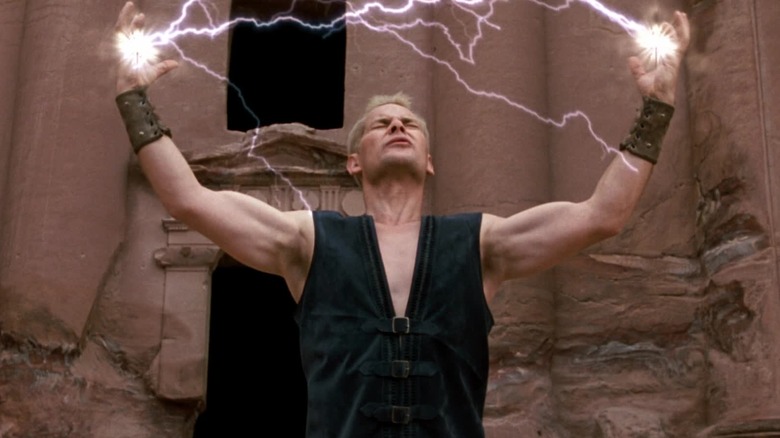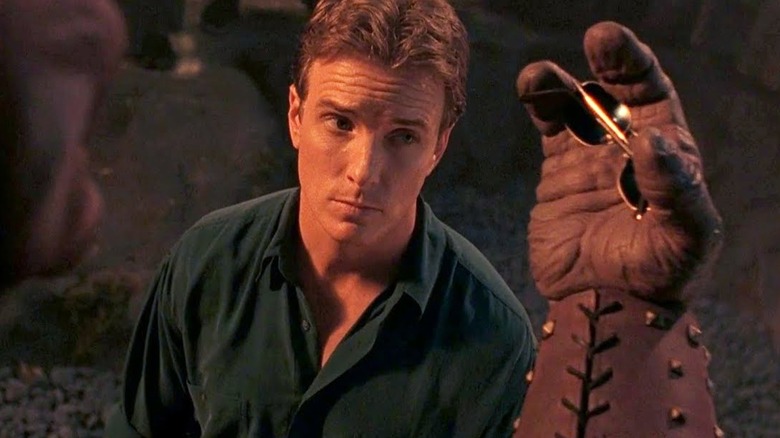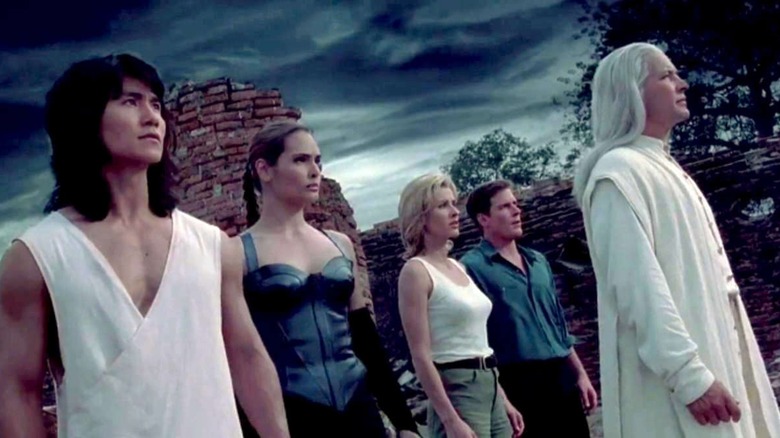We Finally 'Know' Why Mortal Kombat: Annihilation Was So Bad, And It's Hilarious
These days, gamers have it pretty good with video game adaptations. From "The Super Mario Bros. Movie" to HBO's "The Last of Us," there have been enough high-quality adaptations to prove that pretty much game has a chance of becoming a good show or movie. That wasn't exactly true in the 1990s, when a bad case of video game movie whiplash transformed a generation of gamers into non-believers. 1995's "Mortal Kombat" was briefly seen as the gold standard for video game adaptations. It managed to somewhat faithfully recreate the convoluted lore of the "Mortal Kombat" franchise, but more importantly, it captured the essence of the characters and gave fans some thrilling fight scenes. Audiences were optimistic about the sequel — and then "Mortal Kombat: Annihilation" arrived and crushed everyone's faith in game adaptations for years.
"Annihilation" debuted in 1997, and it's still considered one of the worst movies ever made. It has an astounding 4% critics approval rating on Rotten Tomatoes, and the 24% the audience score isn't much better. All the good will built up by 1995's movie was squandered, and it took a more than two decades to get another live-action "Mortal Kombat" flick in theaters. Gamers have long considered "Annihilation" to be a complete misstep, but there's a fan theory that's slowly changing minds throughout the "Mortal Kombat" community. What if "Annihilation" was secretly the most brilliant game adaptation of them all?
Brought to you by Johnny Cage
Gamers are extremely good at crafting wild theories, and despite how terrible "Mortal Kombat: Annihilation" was, the movie still holds a strange place in the hearts of many. It's no wonder that some fans have crafted compelling meta reasons for why the movie was dramatically worse than its predecessor.
What if "Annihilation" isn't really a direct sequel to the original "Mortal Kombat," but is instead a movie inside the original movie's universe? This theory argues that Johnny Cage, feeling inspired after the events of the first movie, decided to direct a film of his own. Johnny wanted to tell his own story, which is why so many characters from "Mortal Kombat" reappear in "Annihilation," but he couldn't convince most of his fellow fighters to join the cast. According to this theory, that's why so many characters are played by different actors in the sequel — and why a few dead characters inexplicably reappear. Of course, as a debut director, Johnny didn't have much pull in Hollywood, which also "explains" why the special effects in "Annihilation" are so abysmal. Cage's general lack of experience with directing would also help to explain why the movie's story is muddled and its performances are (ahem) uninspired. Johnny may be a champion fighter, but that skillset doesn't exactly translate to artistic genius.
Is Annihilation redeemed?
Does this theory/concept save "Mortal Kombat: Annihilation?" No, not really. The movie still features some of the worst performances of the 90s and unfinished special effects that are truly eyeball-melting. "Annihilation" earns every bit of that 4% Rotten Tomatoes score. In reality, the recasting and the poor special effects fall solely on the studio mismanaging its approach to the sequel.
With that said, for those of us who still have some nostalgia for "Annihilation," the "directed by Johnny Cage" concept absolutely makes the movie more enjoyable to watch. It transforms "Annihilation" from a terrible movie into a terrible — but somewhat fun — metafictional movie. Imagining that the wild dip in quality is caused by Johnny's poor direction is hilarious, and picturing him behind the camera really puts certain scenes — like, say, Johnny Cage's death — in a whole new light.
If you haven't watched "Mortal Kombat: Annihilation" since before Y2K, this might be your sign to give it another go. With this theory in mind, watching it with a group of friends might make for an enjoyable evening. At the very least, it might get you extra excited to see the sequel to 2021's "Mortal Kombat," which is due out in the fall of 2025.



